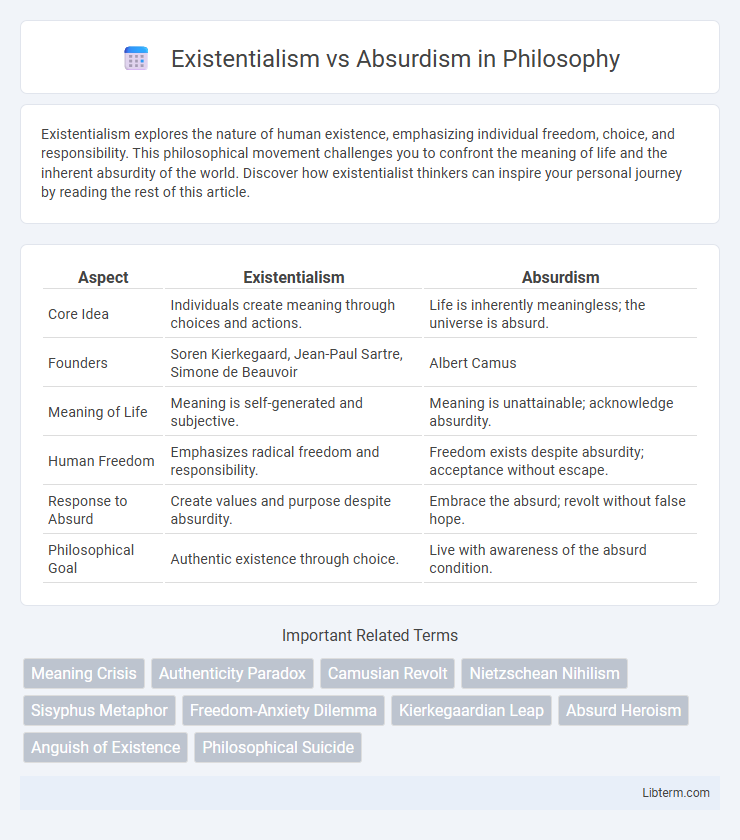Existentialism explores the nature of human existence, emphasizing individual freedom, choice, and responsibility. This philosophical movement challenges you to confront the meaning of life and the inherent absurdity of the world. Discover how existentialist thinkers can inspire your personal journey by reading the rest of this article.
Table of Comparison
| Aspect | Existentialism | Absurdism |
|---|---|---|
| Core Idea | Individuals create meaning through choices and actions. | Life is inherently meaningless; the universe is absurd. |
| Founders | Soren Kierkegaard, Jean-Paul Sartre, Simone de Beauvoir | Albert Camus |
| Meaning of Life | Meaning is self-generated and subjective. | Meaning is unattainable; acknowledge absurdity. |
| Human Freedom | Emphasizes radical freedom and responsibility. | Freedom exists despite absurdity; acceptance without escape. |
| Response to Absurd | Create values and purpose despite absurdity. | Embrace the absurd; revolt without false hope. |
| Philosophical Goal | Authentic existence through choice. | Live with awareness of the absurd condition. |
Introduction to Existentialism and Absurdism
Existentialism explores individual freedom, choice, and the search for meaning in an indifferent universe, emphasizing authentic existence amid inherent anxiety. Absurdism, rooted in Albert Camus' philosophy, highlights the conflict between humans' desire for significance and the universe's silent indifference, leading to the "absurd" condition. Both philosophies address meaninglessness but diverge on response: existentialism advocates for personal responsibility in creating meaning, while absurdism accepts the absurd without false hope.
Historical Origins and Key Philosophers
Existentialism emerged in the 19th and 20th centuries with key philosophers such as Soren Kierkegaard, Friedrich Nietzsche, Jean-Paul Sartre, and Simone de Beauvoir emphasizing individual freedom, choice, and subjective experience. Absurdism, closely linked to existentialism, was largely developed by Albert Camus, who explored the conflict between humans' search for meaning and the indifferent, chaotic universe. Both philosophies arose from existential crises and historical contexts like World War II, influencing modern debates on meaning, freedom, and human existence.
Core Principles of Existentialism
Existentialism centers on individual freedom, choice, and responsibility, emphasizing that humans create their own meaning in an indifferent universe. It asserts that authentic existence arises from confronting the anxiety of freedom and embracing personal authenticity. Absurdism, by contrast, highlights the conflict between the human desire for meaning and the universe's inherent meaninglessness, advocating acceptance of this absurd condition.
Foundational Concepts in Absurdism
Absurdism centers on the inherent conflict between humans' desire to find meaning and the universe's silent indifference, highlighting a fundamental disconnect without resolution. It posits that life is inherently without purpose, yet this realization prompts a rebellion against despair through personal freedom and defiant acceptance. Unlike existentialism, which advocates creating individual meaning despite inherent meaninglessness, absurdism embraces the paradox of searching for meaning in a meaningless world as a core existential experience.
The Search for Meaning: Existentialist Perspective
Existentialism emphasizes personal freedom and responsibility in creating meaning amid an indifferent universe, asserting that individuals must actively define their own purpose. Key figures like Jean-Paul Sartre argue that meaning is not given but constructed through authentic choices and actions. This perspective contrasts with Absurdism, which accepts the inherent meaninglessness of life but encourages embracing the absurd condition without resignation.
Facing Absurdity: Absurdist Response to Life
Absurdism confronts the inherent meaninglessness of life by embracing the tension between human desires for purpose and the indifferent universe. Instead of seeking external meaning, Absurdism advocates for defiant acceptance and personal revolt against the absurd condition through authentic living. Prominent Absurdist thinkers like Albert Camus emphasize creating individual value in an indifferent world rather than escaping or resolving absurdity.
Freedom, Choice, and Responsibility
Existentialism emphasizes individual freedom, choice, and responsibility as core to creating authentic meaning in an indifferent universe. Absurdism acknowledges the inherent conflict between humans' desire for meaning and the universe's silence, highlighting acceptance of this absurdity rather than resolving it. Both philosophies explore the individual's role in confronting existence, but existentialism advocates active meaning-making, while absurdism embraces the irrational freedom born from recognizing life's inherent meaninglessness.
Rebellion vs. Acceptance: How Each Philosophy Responds
Existentialism emphasizes rebellion against inherent meaninglessness by asserting individual freedom and responsibility to create personal meaning in an indifferent universe. Absurdism, founded on the conflict between humans' desire for meaning and the universe's silence, advocates acceptance of this absurd condition without false hope. While existentialists seek to overcome absurdity through purposeful action, absurdists embrace it with defiant acceptance, recognizing the limits of human understanding.
Influences on Literature and Popular Culture
Existentialism and Absurdism have profoundly influenced literature and popular culture by exploring themes of meaning, freedom, and the human condition. Existentialist writers like Jean-Paul Sartre and Albert Camus shaped narratives emphasizing individual choice and authenticity, while Absurdism, rooted in Camus's philosophy, highlights life's inherent meaninglessness and the struggle to find purpose. Their impact is evident in works ranging from existentialist novels and theater to films and music that probe the complexities of existence and alienation.
Comparing Existentialism and Absurdism: Key Differences and Similarities
Existentialism centers on the individual's quest for meaning through authentic choices despite an indifferent universe, while Absurdism highlights the conflict between the human desire for meaning and the universe's inherent meaninglessness. Both philosophies emphasize personal freedom and responsibility, but Existentialism encourages creating subjective meaning, whereas Absurdism accepts the absurd condition without resolution. Core figures like Jean-Paul Sartre represent Existentialism, and Albert Camus is pivotal in Absurdism, illustrating their shared focus on human experience amid existential uncertainty.
Existentialism Infographic

 libterm.com
libterm.com